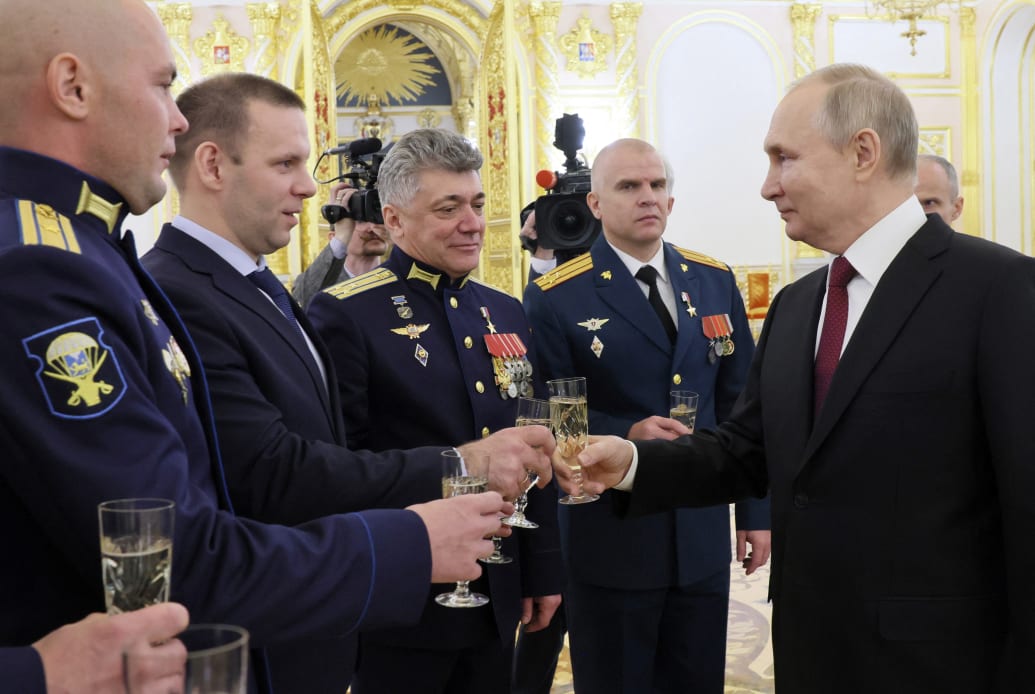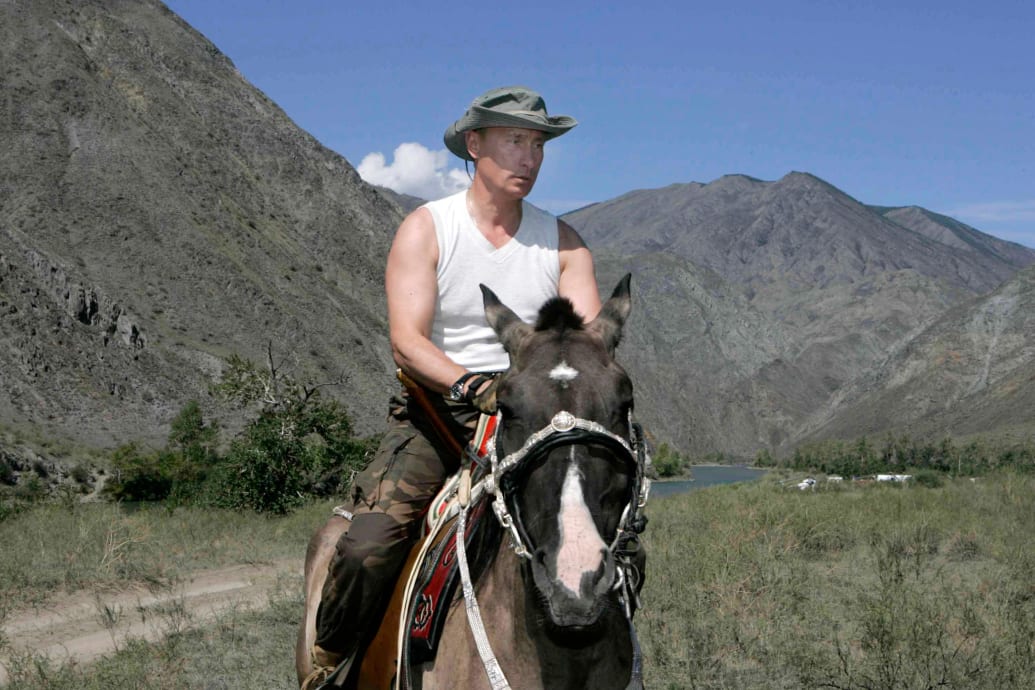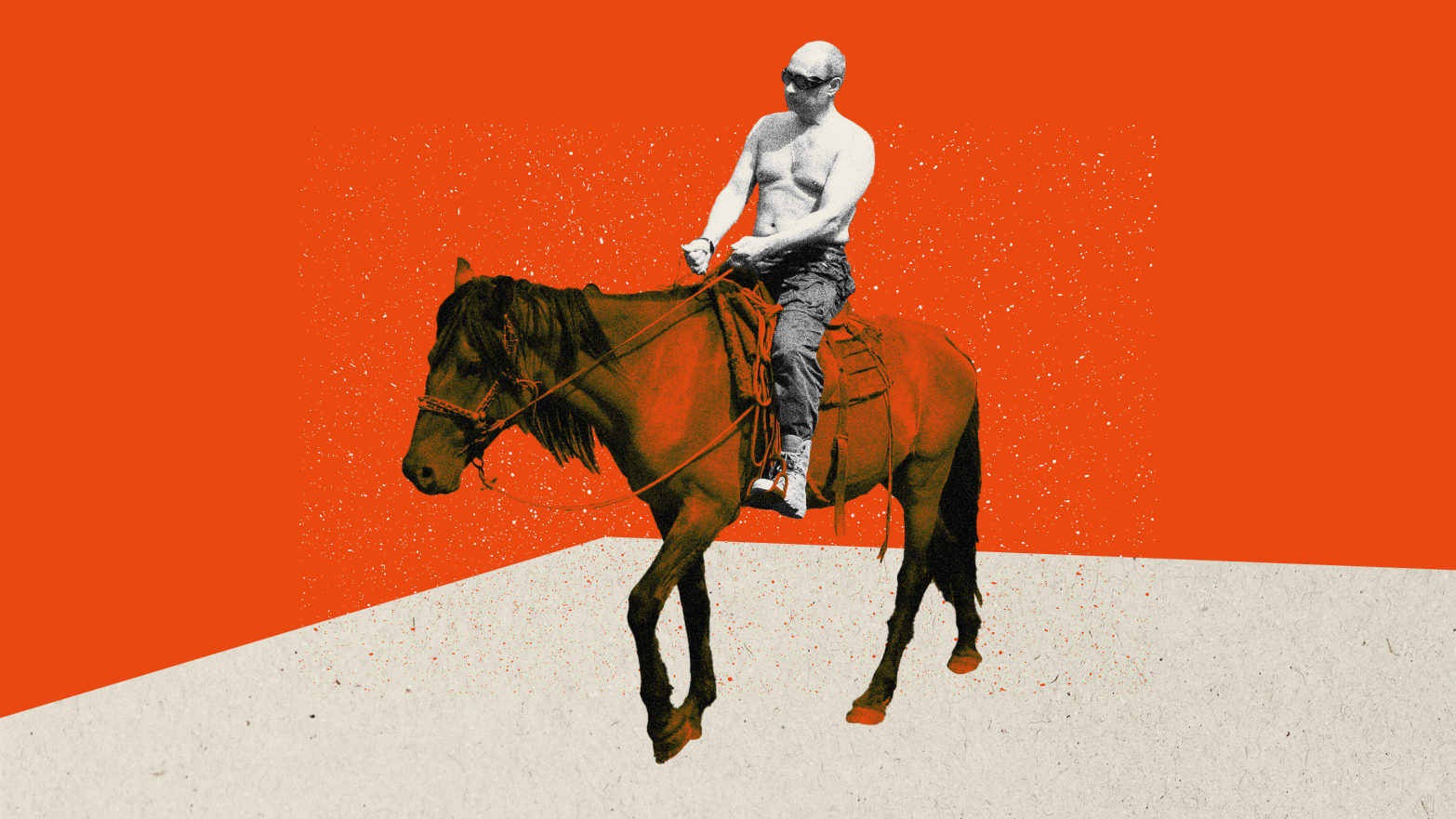Russian President Vladimir Putin is diving headfirst into an unprecedented—and irreversible—public image disaster over the war in Ukraine.
Long gone are the days of carefully staged photoshoots of Putin riding a horse bare-chested, or diving into rivers to find ancient Greek urns. Now, images of Volodymyr Zelensky visiting Ukrainian soldiers in combat zones across the country stand in stark contrast with reports of the Russian president holding court in the Kremlin and meeting with ministers and generals at comically long tables.
And when the Russian president did finally travel to the war zone, the image he struck shocked former aides and public relations experts.
A day after the International Criminal Court issued a warrant for his arrest for war crimes this month—the Kremlin announced that Putin had flown by helicopter to Mariupol and driven a car into the city. Russian officials released a shaky, amateur-style video of the Russian president looking quite miserable, nervously playing with the zipper of his parka with sounds of explosions in the background.
“Putin’s left his comfort zone in the bunker, where he has spent three years, and it is phenomenal to see how his publicity stunts have degraded,” long-time Kremlin observer, Olga Bychkova, a former presenter on Echo of Moscow radio station, told The Daily Beast. “He is surrounded by security guards. No professional cameramen have access to him any longer.”
So, how did the Russian president’s macho publicity stunts take such a nosedive?
“When I met with Putin in the Kremlin for the first time, I was 22 years old. He was a total superman, he had all the power there was,” one exiled former member of Putin’s ruling party, Robert Schlegel, told The Daily Beast of his meeting with the Russian president in 2006. Back then, Putin was welcoming young nationalist activists into his sphere of influence, including Schegel, a member of the pro-Kremlin youth movement “Nashi” at the time.
First as a Kremlin activist, then as parliament member, Schlegel was responsible for filming several pro-Putin propaganda videos that he’s now ashamed of.
“The promotional videos for United Russia were produced by political analysts and television channels like Channel One and NTV. Those same people, like Ernst, worked on Putin’s image,” Schlegel told The Daily Beast, referring to Konstantin Ernst, the director of Channel One. “Putin was half-God for everybody who believed in him. Now he is older, and indeed, a significant amount of his time he spends in some bunker with a limited number of people who have access.”
Schlegel ultimately served as a lawmaker in Putin’s system for 10 years—until, he said, he could no longer stand it. The former parliament member left the United Russia party in 2016 and now lives in Germany.
“The video they took of him for the New Year speech was totally unprofessional, it was probably made by somebody from the federal security service,” Schlegel said, referring to a bizarre video of Putin commenting on the war during a champagne toast. (“There is a lot of noise now about our strikes on the energy infrastructure of the neighboring country. Yes, we are doing that,” the Russian president said in the clip.)

Vladimir Putin toasts with servicemen awarded with Gold Star medals of Heroes of Russia during a ceremony on the eve of Heroes of the Fatherland Day, at the Kremlin in Moscow, Russia December 8, 2022.
Sputnik/Mikhail Metzel via Reuters
Meanwhile, Moscow’s clampdown on Putin’s critics is in full gear. Last week, Russian authorities broke into the offices of Nobel Peace Prize-winning human rights group Memorial and confiscated three decades worth of archives documenting the Kremlin’s human rights abuses.
“How truly lost he is.”
The image of Putin playing his piano, singing “Blueberry Hill” on stage with Kevin Costner, Sharon Stone, Monica Bellucci, and other Western idols is a far cry from the current image of the Russian president as a lonely, isolated man.
One of the original masterminds of Putin’s early publicity stunts is Marat Gelman, the Kremlin’s former political technologist. In an interview with The Daily Beast, he recalled the summer of 1999, when only about 2 percent of Russians knew who Putin even was.
“I regret that time and my role now, of course. The idea was to stage scenes of Putin being active, traveling, doing things, solving problems without saying a word,” Gelman, who is now an art collector and gallerist, told The Daily Beast. “I wrote texts that were published in newspapers as his, and at some point they put billboards around St. Petersburg with words by Jean Baudrillard, presented as Putin’s. We all giggled quietly at the campaign headquarters.”

Vladimir Putin rides a horse near the Western Sayan Mountains in southern Siberia's Tuva region August 15, 2007.
Ria Novosti/Kremlin via Reuters
Gelman remembers Putin as very quiet, obeying his campaign managers without question, she said.
“He was not afraid, it seemed he did not care much if he would lose, but now he is really terrified, because of the real danger he is facing,” Gelman told The Daily Beast. “He has burnt everything… And people around him must also be terrified, because they know much more than all of us about how truly lost he is.”

